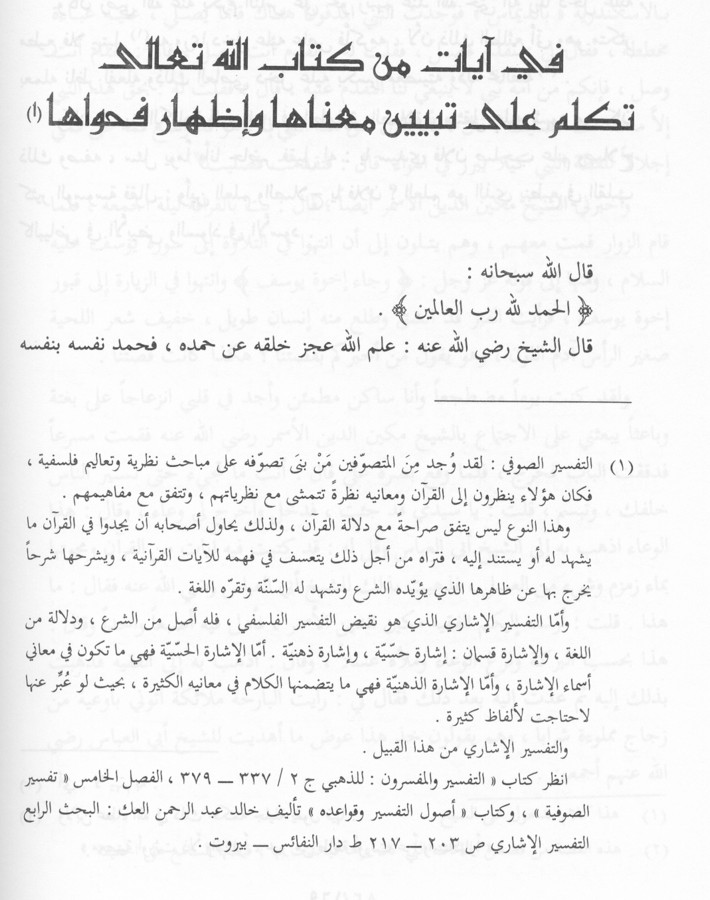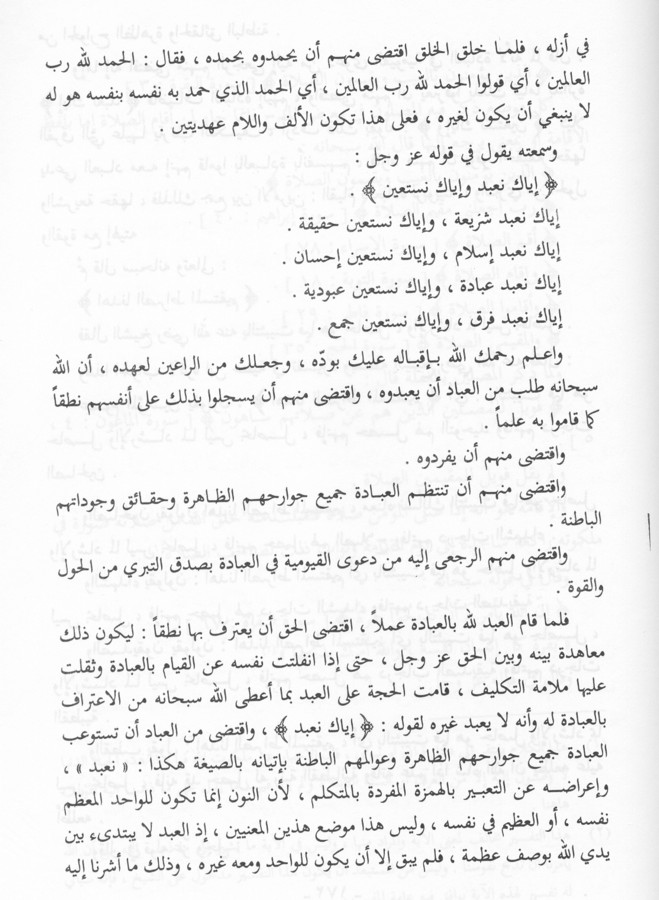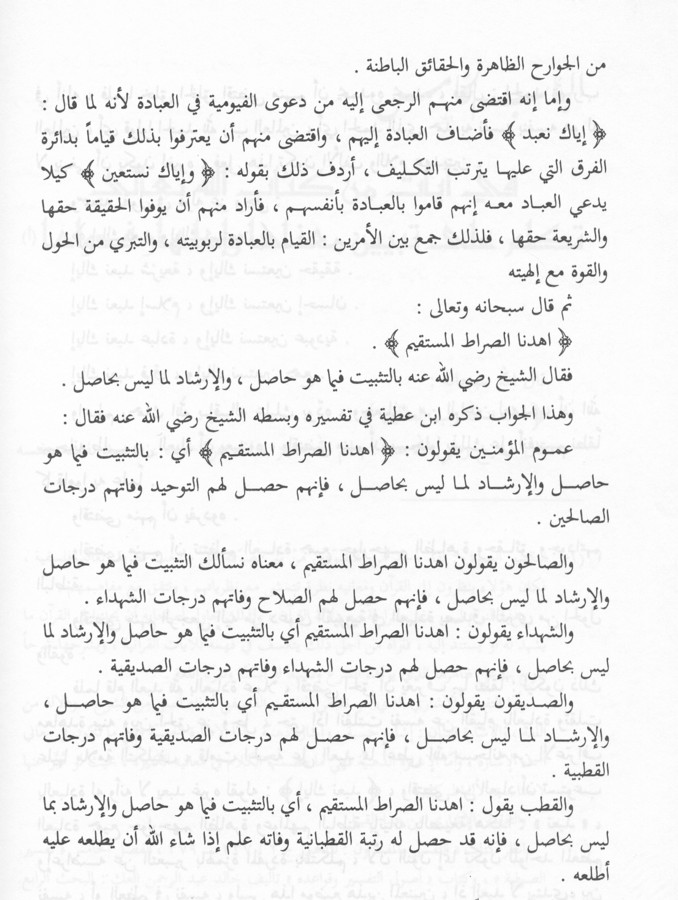

Tafsir Fatiha by Ibn Atā’ol-lāh Al-Eskandari
Discussion Join
Allah Subhāna-Hu
(All Glory for Hu) has said:
“The/All Hamd
(Praise) for Allah
the Rabb (Master Administrator, Lord)
of the universes”
Allah was
aware of the inability of Hu's (ITs) creation with regards to
Hamd (Praising)
for Hu (IT),
for in Azal (Sempiternity) Hu praised
Hu,
and when Hu created the creation Hu required from them the praising
and
therefore said: “The/All Hamd (Praise)
for Allah the Rabb (Master
Administrator, Lord) of the universes” or “'say' all praise for Allah…”
meaning the Al-Hamd (Praise)
that was issued by Hu to
Hu is unbefitting
for another, whereby that is the application/consequence of the Arabic
article Al (The). (No one can praise Allah in any
due measure therefore
Allah
praised Allah eternally and issued words of the Al-Hamd
for us to echo
such vitiated human praise in this temporal world)
And I heard him (his sheikh) saying about the verse:
“You we do worship, and You we do seek”
“You we do worship” is Shariah (Prophetic Ways). (Through Shariah we
learn the proper mannerism to worship when we are upon the Divine Path
by following the prophets)
“You we do seek” is Haqiqa (Absolute True Reality). (Dara: Every
moment,
every heartbeat, every exhalation & inhalation, every need to be
fulfilled, every love yearned for, every loss mourned and in general
everything that is ventured upon was to seek after ‘You’ and that is a
reality a fact a truth similar to the sun that is in the sky in front
of us. We do not fully understand the sun nor do we have any control on
it but we feel the light and warmth no matter who we are and no matter
where we are.)
“You we do worship” is Islam (Submission: That every moment you are
filled with cognizance that this moment is precisely how Allah wished
everything to be, and you are willing to be as Allah wishes you to be,
your heart at ease with whatsoever Allah may choose for you and your
loved ones.)
“You we do seek” is Ihsān.
(Seeking You as if we see You and if we
cannot see You seeking you as if You staring at us.)
“You we do worship” is Ibāda (Serfdom, Servitude, Adoration, Devotion).
“You we do seek” is ‘Ubūdiat (Bondage).
“You we do worship” is Farq (Partition).
(As soon as we start
worshiping or serving, the very involvement of our own Self
causes the
partition)
“You we do seek” is Jam’ (Togetherness).
(Similar to being carried on a
vessel down a river towards the destination (Hu (IT)),
nothing of our
own Nafs (Self)
making any difference in this navigation, we
are carried via togetherness)
Know that Allah
has been merciful to you by ITs Wudd (Illimitable
Irreducible Love) and has made you one of the responsibles/upholders of
ITs covenant, Allah demands from ITs slaves to worship/serve IT, and
requires from them to register as such within their Nafs (Self)
with spoken words as with knowledge.
And requires from them to single Hu (IT)
out as a matchless singleton
(Fard).
And requires from them to discipline/organize Ibāda (Serfdom,
Servitude, Adoration, Devotion) within all their limbs i.e. Zāhir
(Surface Manifest) and within the Haqiqa (Absolute & True Reality)
of the Bāten (Hidden Interior) of their Wujud (Beingness).
And when the slave of Allah stands to
worship Allah with deeds &
actions, Hu (IT)
requires from him to acknowledge Hu via spoken words
as well: For this was a covenant between him and Hu. (And this is so)
Since there are times when the heaviness of Taklif (Burden,
Responsibility) lets his Nafs (Self)
slip away from Ibāda
(Serfdom, Servitude, Adoration, Devotion) and thus the Divine Authority
stands unwavering upon the slave with the endowment of a confession
confessed for Ibāda (Serfdom, Servitude, Adoration, Devotion): “You we
do worship”—Solely acknowledged for Hu (IT).
Moreover Hu (IT)
requires from all the salves to enforce Ibāda
(Serfdom, Servitude, Adoration, Devotion) on everything of theirs
either Zāhir (Surface Manifest) or Bāten (Hidden Interior) and for this
reason the plural term ‘we’ used as in “You we do worship” and not the
singular term ‘I’ to indicate the unification of Zāhir (Surface
Manifest) and Bāten (Hidden Interior) into one ensemble. (And ‘I’ of
the
Nafs (Self)
cannot be magnified in Presence of Allah
Almighty. And thus the plural term signals the unimportance and
invalidity of I-ness in Divine Presence and the term ‘we’ signifies the
I-less approach towards Hu (IT))
“You we do seek” is for the slaves not to attempt to worship their own
Nafs (Self)
so in summation mode: “You we do worship” + “You
we do seek”.
End.
© 2006-2002, Dara O.
Shayda, Hind Rifai M.D.







